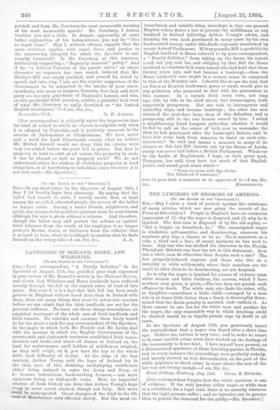LANDLORDS IN IRELAND, ESSEX, AND WILTSHIRE.
[To TON EDITOR OF Tut " OFRICTATOR,"] SIB,—Your correspondent, "A Family Solicitor," in the Spectator of August 11th, has gratified your wish expressed in your review of Mr. Russell's article in the National Review, and shown that Wiltshire and Essex landlords have suffered heavily through the fall in the capital value of land of late years. But even if it is a fact that this fall has been much greater in England without Land Acts than in Ireland with them, there are many things that must be taken into account before we can admit that the Irish landlords are not far the greatest sufferers. To leave out those things necessitates an empirical treatment of the whole case of Irish landlords, and Irish tenants. To consider and examine them fairly would be far too great a task for any correspondent of the Spectator. In the pages in which both Mr. Froude end Mr. Lecky deal with the manner in which the English Government of the seventeenth and eighteenth centuries annihilated Irish manu- factures and trade, and threw all classes in Ireland on the land for maintenance, until ladders of middlemen weighed, as they still weigh, on it, you have the key to the whole Irish land difficulty of to-day. At the close of the last century, Arthur Young said the hope of Ireland lay in the then race of idle, drinking, card-playing middlemen either being induced to enter the Army and Navy, or to become industrious, hard-working farmers, — not mere squireens living on high-profit rents. Now, no impartial student of Irish history can deny that Arthur Young's hope in treat extent realised, though not fully. But more could be seenexpected. Great changes of the kind in the life west of Manchefeare only effected slowly. But the most ex- traordinary and notable thing nowadays is that our present English rulers desire a law to prevent the middleman or any landlord in Ireland following Arthur Young's advice, and farming his own land, purchased in many cases by his own hard-earned money, under title-deeds expressly sanctioned by recent Acts of Parliament. If they passed a Bill to prohibit the English landlord in Essex referred to by your correspondent, a " Family Solicitor," from taking up the farms his tenant oeuld not pay rent for, and obliging by that Bill the Essex landlord to reinstate in it some tenant who had held that farm twenty years ago, and had become a bankrupt,—then the Essex landlord's case might in a certain sense be compared to that of the Munster one. I should like to see the look that an Essex or Kentish landowner, great or small, would give to any politician who proposed to deal with his possessions in this manner. In a certain Irish town were, not long ago, side by side in its chief street, two ironmongers, both apparently prosperous. But one took to intemperate and unthrifty ways, and became bankrupt ; the other has now obtained the next-door large shop of this defaulter, and is prospering still in the two houses owned by him. I asked a neighbouring Land Leaguer yesterday, whether it would be fair to call on the owner of both now to surrender the shop he had purchased after the bankrupt's failure, and to have him come back from America to insist on such rein- statement ? So wild and insane a measure in many of its clauses as this late Bill thrown out by the House of Lords, surely was never laid before a British Parliament. Whatever be the faults of Englishmen, I hope, as their great poet, Tennyson, has said, they have too much of that English justice and sound good sense which- " Turns to scorn with lips divine
The falsehood of extremes," ever to pass such a measure or to approve of it .—I am, Sir;
HIBERNICUS.
































 Previous page
Previous page